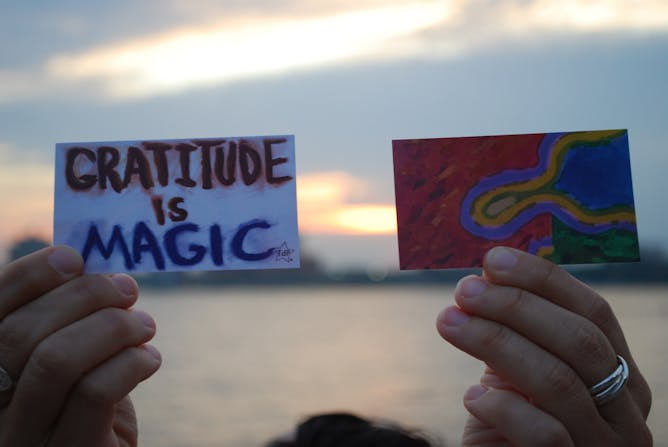Editor's note
|
|
New Year’s resolutions are in full swing for millions this week, and chief among them is “I’m going to lose weight.” The disturbing truth behind this high hope is that Americans are not losing weight but gaining it. Kenneth Cusi, professor of endocrinology at the University of Florida, explains the science behind weight loss efforts in the first of a series of special articles on obesity. “Research has shown,” Cusi writes, “that the fixes are not about dieting.”
Whether your resolution is weight-related or not, you may need some self-control in order to cross it off the list. Texas A&M’s Marco Palma used a biometric approach to investigate a long-running question about self-control: Is it a finite resource you can exhaust or is it a skill you can build up with practice? What he found may help you successfully stick with those resolutions.
And for those wanting to start the year by expressing gratitude, Penn State’s Jeremy David Engels suggests rethinking how it is defined – not as a debt, but as an opportunity.
Happy 2018!
|
Lynne Anderson
Health + Medicine Editor
|

|
|
Top stories
|

A woman exercising. Thousands of people will be doing the same this week in an effort to lose weight, a perennial resolution.
UConn Rudd Center for Food Policy and Obesity
Kenneth Cusi, University of Florida
Despite the efforts of millions of Americans, obesity rates continue to climb. Why is it so hard to lose weight and to keep it off? It's a lot more complicated than just pushing back the plate.
|

Let your self-control gain momentum like a snowball rolling downhill.
Sira Anamwong/Shutterstock.com
Marco A. Palma, Texas A&M University
Could your resolution resilience use a little scientific research to back it up? A new study suggests practice can help your self-control – but don't push it too far.
|

What really is the art of gratitude?
Joanne Morton
Jeremy David Engels, Pennsylvania State University
Why you might be getting gratitude all wrong.
|
|
|
|
|
|
|
Education
|
-
Anthony P. Carnevale, Georgetown University; Andrew R. Hanson, Georgetown University; Megan Fasules, Georgetown University
Unlike the days of old, career and technical education in today's high schools doesn't really prepare students for work. Researchers at Georgetown University explain why CTE must be revamped.
|
|
|
|
From our international editions
|
-
Esther Ndumi Ngumbi, Auburn University
There were some African food security initiatives from 2017 that deserve a special mention for the precedent they set.
-
Patricia Hogwood, University of Westminster
The Chinese zodiac predicts justice, openness, tolerance and innovation for the year ahead. After a difficult political year, it could be just the tonic.
-
Caillan Davenport, Macquarie University
On January 1, we consider the origins of Janus, after whom this month is named.
|
|
|
|
| |
| |
|
|